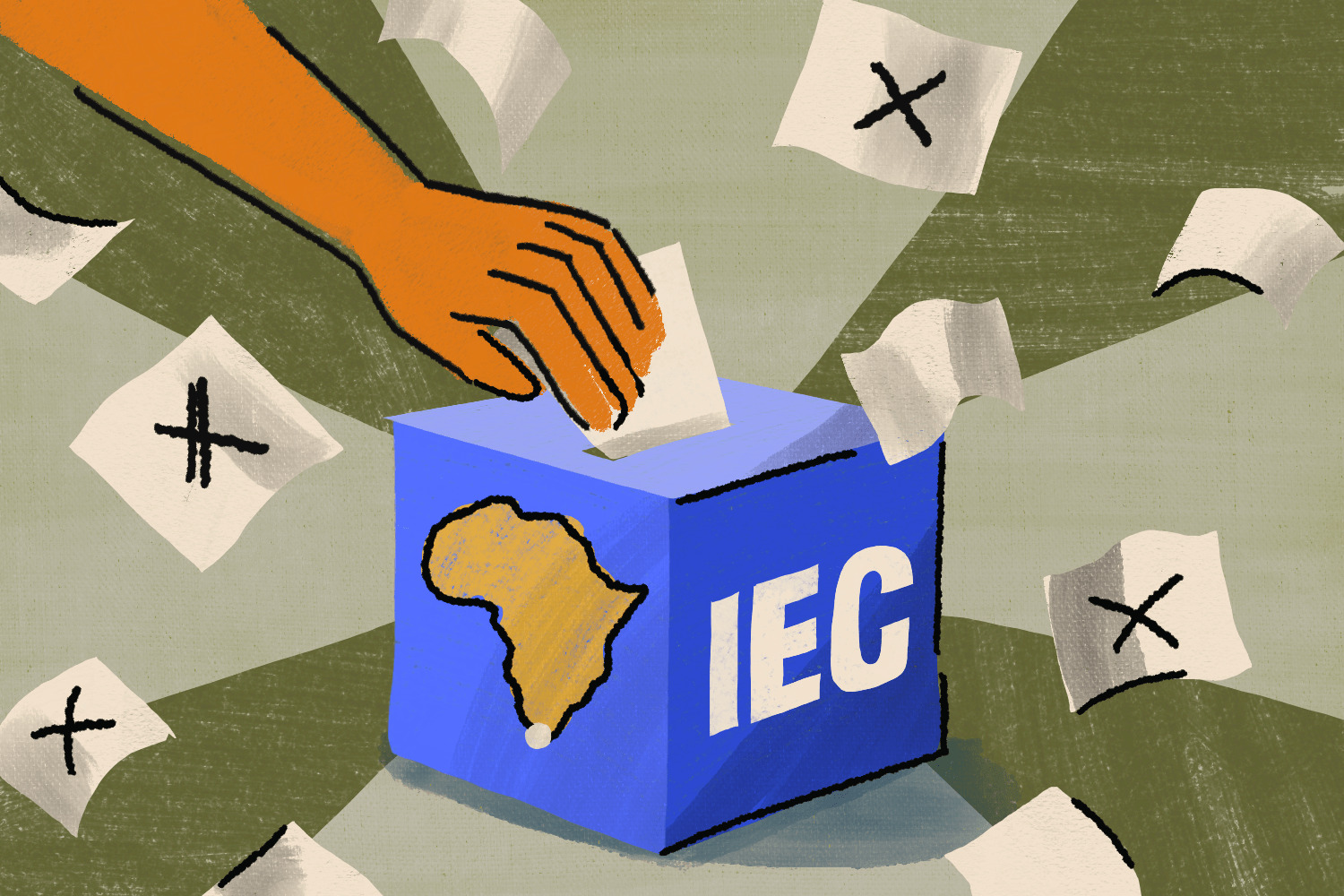If no party wins an outright majority on voting day, it will complicate the process of forming a new government given that neither the Constitution nor legislation contains detailed provisions to regulate the formation of a coalition government. But the law nevertheless provides pivotal guidance on how such a process will have to unfold.
The first thing to note is that the Electoral Act requires the Electoral Commission (IEC) to declare the final results of the election within seven days after voting day, but only after it has resolved all objections by political parties about alleged irregularities on voting day or about the counting and tabulation of results.
The IEC may, nevertheless, declare the election result before all counted votes have been received from voting stations if this would “unduly and unreasonably delay the determination and declaration of the result of the election and if the outstanding results are not likely to materially influence the overall result of that election”.
If the IEC is unable to declare the election results within seven days, section 57(4) of the Electoral Act permits the IEC to ask the Electoral Court to extend the period within which the commission must determine and declare the result of an election, and the court may extend the period “on good cause shown”.
If something catastrophic happens and it becomes impossible for the IEC to declare the final results of the election (something that might occur if there is widespread disruption of voting or the counting of votes), or if the election is set aside by a court, a fresh election would have to be held.
Whatever happens, South Africa will not be left without a government, as section 94 of the Constitution provides for the President, the Deputy President, ministers and any deputy ministers to continue functioning “until the person elected President by the next Assembly assumes office”.
Time limit
To ensure that the outgoing government does not cling to power by delaying the election of a new President, the Constitution requires the National Assembly to elect a new Speaker and a new President at the first sitting of the National Assembly which “must take place at a time and on a date determined by the Chief Justice, but not more than 14 days after the election result has been declared.”
The rules for the election of the Speaker and the President contained in Schedule 3 of the Constitution seem to have been designed to prevent a stalemate in the election of the Speaker and the President by ensuring a result.
The vote is required to be conducted by secret ballot and a candidate needs to win a majority of the votes (in other words, more than half the votes) to be declared the winner. If more than two candidates are nominated and no candidate receives a majority of the votes, the candidate who receives the lowest number of votes must be eliminated and a further vote must be taken. This procedure must be repeated until one of the two remaining candidates receives a majority of the votes.
It would not be possible for MPs to collapse the election of the Speaker or the President by walking out of the Assembly, as section 53(b) of the Constitution makes clear that a vote can be taken as long as one-third of MPs are present. However, I am not sure if MPs could sabotage the election by spoiling their ballots to deny any candidate from winning a majority of votes. (Readers with practical experience of this type of election at local government level might be able to shed light on this question.)
I am thinking of a situation where candidate X wins 198 votes, candidate Y wins 197 votes, but five votes are spoilt. If spoilt ballots were counted as votes, 400 votes would have been cast, which would mean a candidate would need to win 201 votes to be elected, but if spoilt ballots were not counted, then only 395 votes would have been cast leaving candidate X as the winner as he or she would have received a majority of the votes.
However, I assume that spoilt ballots would not count as votes for the purposes of determining whether a candidate had received a majority of votes, as the Schedule does not refer to “votes cast” (which would include votes cast but spoilt), and as the alternative interpretation would not align with the overall scheme of the Schedule to force a final results to ensure that a Speaker and President will be elected at the first sitting of the Assembly.
I have provided a detailed analysis of the procedures to elect the President, because – from a constitutional perspective – this election is the pivotal moment for the formation of a government. Here it is important to note that once elected, the President becomes the head of state and the head of the executive, and in the latter capacity the President has the right to form a government by appointing the Deputy President, and all ministers and deputy ministers.
Pressure
This means that political parties represented in the Assembly will face pressure to reach agreement on the formation of a coalition government before the first sitting of the Assembly, which must be held within 14 days after the election results have been declared. If no agreement is reached, many political parties represented in the Assembly will be forced to make difficult decisions about which candidate ultimately to support in the election of the President, knowing that once elected, the President will have to form a government by appointing the Deputy President, as well as Cabinet ministers and deputy ministers.
As an aside, if the ANC falls significantly short of the 50% mark in the Assembly elections, a truly Machiavellian set of political leaders could in theory exploit the provisions of section 88 of the Constitution to end the political career of President Cyril Ramaphosa by supporting his election as President, and then supporting his removal from office a few days or weeks later.
This is because section 88(2) of the Constitution states that “no person may hold office as President for more than two terms”. Section 88(1) makes clear that a person elected as President at the first sitting of the Assembly after an election serves a full term, whether he or she completes the term or not. But a person elected President to fill a vacancy at any other time does not complete a term.
This means that if Ramaphosa is re-elected President at the first sitting of the Assembly after the election and is removed from office through a vote of no confidence shortly afterwards, he would have served two terms and would be ineligible for re-election, even if his successor was removed from office a few days or weeks after his or her election.
Strangely, if somebody else were to be elected President at the first sitting of the Assembly after the election, only to be removed shortly afterwards and replaced by Ramaphosa, the entire term served by Ramaphosa would not count as a term and he would actually be eligible to serve a full third term after the 2029 election.
Lure of positions
Leaving aside the unlikely scenario I sketched above, once elected, it may arguably become easier for the President to persuade potential coalition partners to join the government. Pivotal here is the power of the President to offer MPs from other parties positions as ministers or deputy ministers. Unlike at local government and provincial government level, there is no legally imposed limit on the number of ministers and deputy ministers the President can appoint, which means that there is vast scope to entice opposition parties into the government by offering them positions in Cabinet.
For as long as no coalition agreement is reached, the President and his or her Cabinet will have to govern as a minority government, as it would not be able to count on the support of the majority of members of the Assembly. This might make it difficult to govern and to pass legislation, which could lead to a crisis if the President and his or her Minister of Finance are unable to secure support from the National Assembly to pass the national budget or other money Bills.
Stable coalition
The best way to ensure the formation of a relatively stable coalition government would be for parties in the coalition to reach a comprehensive agreement that goes beyond agreement between parties on how many Cabinet posts and deputy minister posts each coalition partner would be entitled to, and the portfolios they would be allocated.
Ideally a coalition pact would also include agreement on the broad policy priorities that the coalition will seek to pursue, and on the non-negotiable issues that coalition parties will required not to compromise.
Even if a comprehensive coalition agreement is reached, this will not guarantee the stability of the coalition government. Unscrupulous coalition partners may try to blackmail the dominant partner in the coalition by threatening to support a vote of no confidence in the President in terms of section 102 of the Constitution. Of course, while unlikely, coalition partners may also withdraw from a coalition and help to oust the government through a vote of no confidence for principled reasons.
That said, we simply do not know what will happen on 29 May, and how our government will look when it is formed two weeks later. But whatever happens, I can only hope that we will end up with a relatively stable and coherent government. DM





